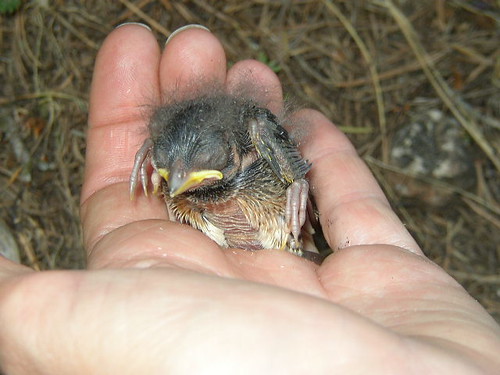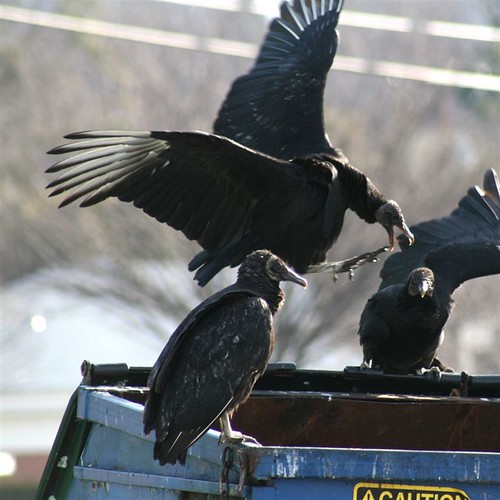Up at seven, off to the gym. I remembered to bring a magazine this time and passed 25 minutes on the gerbil stepper reading in The New Yorker about the historical controversy over what exactly Secretary of War Edwin Stanton said when Lincoln finished dying in front of him: either “now he belongs to the ages” or “now he belongs to the angels.” Apparently the answer depends on what the historian’s politics are. Such were the deep thoughts in my mind as I fed Zuzu some more “ocean fish feast” and spent the rest of the morning typing up the diary and the bird camp dispatch. The time I put into these things. It’s like a job. Except you get paid for those.
I spent the afternoon at work because there was something I wanted to make sure about and I couldn’t stand to wait until Monday to verify that I had really discovered the solution that I thought I had. (Vague enough for you?) No one likes to go into work on a weekend, including me. But a confluence of factors – mainly related to how satisfying it will be when I prove the point I’m working on – made for an exception. On my way to work, I ran into Kirk, the lawn guy, on my front steps, about to knock and inquire if I wanted the grass cut. I told him I had no cash, so maybe he should come back on Sunday. We walked down the steps together, and he bent to collect his brown-paper-bagged can of beer from the bottom step before lurching off up the street.
I was finished at work in time to not be too late getting to my old coworker Lauren’s housewarming party in Hamilton. She took her time getting around to one of these, since I think she bought the house almost a year ago. Guess she’s part of the trend resulting in “single women buying houses at twice the national average in Baltimore.” The table was covered with delicious food prepared by people I vaguely know through work-related activities, employees of various city agencies mixed with Lauren’s boyfriend’s Puerto Rican friends, one of whom, a heavy-set fellow with thick black hair, was a good-natured hearty fellow who laughed a lot. There’s no problem with that, of course, but his canines were long and pronounced and sharp, giving his smiles a vampiric aspect that I couldn’t quite get used to. Fortunately there was a good deal of garlic in the guacamole, so I kept a chip loaded up at all times just in case. There was an awkward moment when a vague acquaintance, who I did not previously know was gay, mentioned his “date,” who was not in the room; in continuation of a joke we were all contributing to – concerning how strange it can sometimes be introducing one’s significant other to co-workers for the first time – I kept saying “she,” and it only gradually dawned on me why everyone else had gotten really quiet.
I wandered out into the back yard, where a very pregnant woman, her toes bright red from all of that pressure, was practicing her googley eyes and exaggerated vowel sounds on another woman’s newborn. A ring of people sat in plastic chairs near the keg, and a toy dog in the yard next door would not shut up. Gradually the yapping faded into the background. I got talking to Lauren’s boyfriend; “somehow” it came up that I had been in the Coast Guard, and he paid me the compliment of pretending to be interested in my stories for quite a while. I’ll have to have some new adventures sometime soon, before the most interesting thing about me recedes more than a decade into my past. (Has it really been eight years since I was “rung ashore” from my last boat?) Actually, the most interesting thing about me now is A. and her job, which just seems to fascinate people. “In a tent?” they ask, aghast, but, on the other hand, the part that involves working with baby birds seemed to really captivate a few people who are themselves stuck behind health department computers all day long. (They struck me as the type to keep photographs of cute baby animals taped to said computers, although I’m not sure if they really know what a baby songbird looks like.) Still, these are city folk, and I can tell they mostly think we’re crazy for moving to the sticks.
Driving back from the party, I decided I was in the mood for some mindless entertainment and stopped for a movie. Maybe because I’d heard “We Are the World” on the classic rock station earlier, I was in an eighties mood, and I suddenly remembered reading somewhere that the new Miami Vice movie was actually watchable and true to the spirit of the original show, not least because it uses the song “In the Air Tonight,” which anyone who used to watch this show knows is key. So, after consulting with the Video Americain staff as to where it might be classified under their talmudic organizational system (thrillers? action? ah, the Michael Mann director’s section), I snapped it up and headed home. Frankly I don’t know what I was thinking. NOTE TO SELF: sometimes people who watch a lot of Hollywood movies are impressed by one that is better than most, but remember that this is like a plumber telling you that your clogged sewage line is not as bad as some others he’s seen. Whatever movie they’re talking about may in fact be better than other Hollywood movies, but that’s quite a different thing from saying that it’s actually good.
At first, I thought I’d made a good choice: the cinematography was beautiful, and, if the action seemed cheesy (do the two detectives really have to be world-class rocket boat drivers?), it was at least tensely plotted for the first few scenes. But the spell was broken by this agonizingly long sex scene between Tubbs and his cop girlfriend about 28 minutes in; it’s not that I’m opposed to such scenes in general, but this one seemed so gratuitous and fakely glorious that I considered fast-forwarding. And it went downhill from there. First, Crockett got to have exactly the same scene with his girlfriend, only his was tinged with tragedy because – since she seemed to be involved at a high level in the international drug-smuggling cartel he was infiltrating – you knew it couldn’t turn out well. Then, this strange parity continued when both detectives’ girlfriends separately fell into one or another bad guys’ clutches and each had to be rescued. And shouldn’t Sonny’s girlfriend have died or gone to prison in the end? She seemed really nice, but there’s “nice” and then there’s “not helping to finance multi-million-dollar cocaine deals with murderous psychopaths,” and the latter is one of the main qualities I personally look for before deciding to get close to someone. So it was hard to sympathize when their love turned all star-crossed, and it was even harder to believe that Sonny has the kind of pull that lets him spirit her away from the scene of the final shootout, while the SWAT guys are slipping plastic cable-ties on everyone else’s wrists, and put her on a boat (and why to Atlanta, of all places?). He promises her that “no one will follow you”; I guess he’s just going to tell the FBI, “she’s cool.” But it was clearly an emotional moment when they said goodbye. His eyes grew moist and limpid and the wistful yet sensual way he stroked his mustache really affected me.
“In the Air Tonight” was used correctly, at least. The tension in the singer’s voice builds as we cycle through a montage of dangerous men getting ready for a dangerous night: thugs in cheap suits standing around tensely on a pier, cops clacking the slides on their pistols and pushing rounds into magazines, the palm fronds shivering in the night breeze off of the ocean. The speeding car, the tense phone call. “Let’s do this.” The only problem was they didn’t use the original song. The mistake there is that, really, this song sucks, like pretty much everything else Phil Collins – a man who says, of his creative process, that “the way I write lyrics is I open my mouth and I see what comes out” – has ever done and will ever do. But his version of this particular song is permanently part of the Miami Vice mystique, and, used correctly, it really works well as soundtrack music. I can’t think of the old show without thinking of this song playing over detectives settling into their positions for some final raid, the drums coming in when everyone realizes that the informant is compromised and will certainly die before they kick the door in, the last bars echoing away in the aftermath of some slow-motion bloodbath… The song was probably only ever used in one episode, but in my memory it was in every one. Maybe this 1980s song would have sounded too anachronistic over the clearly updated setting. Or maybe Phil wanted too much money to let them use his version (although someone would have had to pay for the cover, I guess). But the version they used was some awful modern approximation of the original, and, from that point on, I found myself just waiting for the movie to end.
The final verdict: yet another production that may once have had a chance at being decent, ruined by too much money and too long a running time and too much input from committees instead of creative people, all of which I guess is a long-winded way of saying “a Hollywood movie.” It occurs to me that it must be so easy to write the script for something like this. I guess the hard part is sublimating whatever dream you once had of doing high-quality work you could be proud of, but once you get over that ridiculous hangup, you can just sit back, cash the checks, and quickly change the subject when someone at a party asks “what do you do?”



